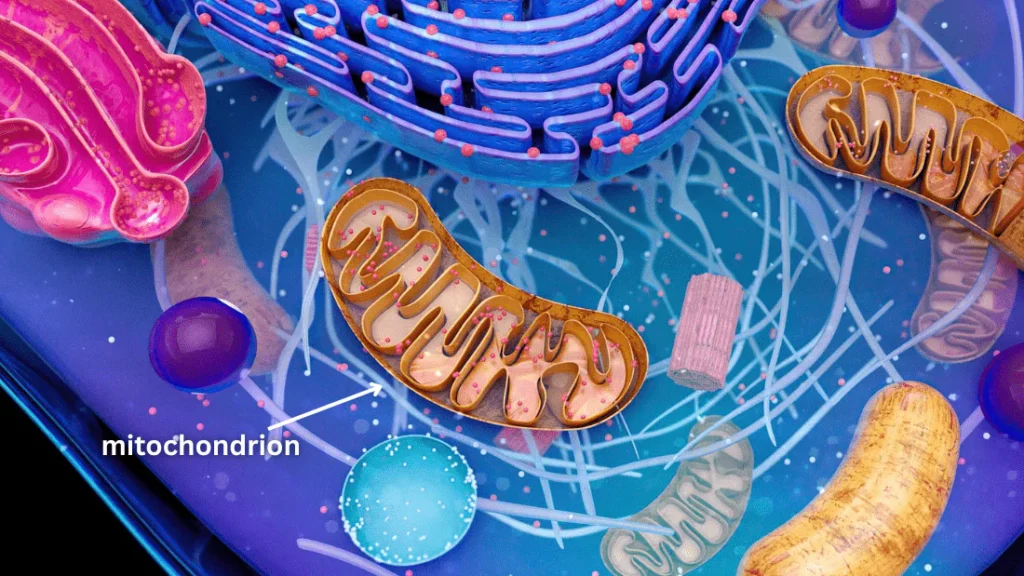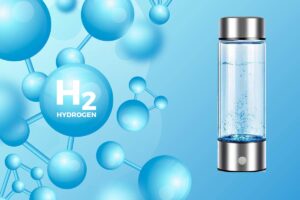Mitochondria, often referred to as the “powerhouses of the cell,” are essential for energy production, metabolic regulation, and overall cellular health. When mitochondria are exposed to oxidative stress, their efficiency declines, which can contribute to fatigue, aging, and chronic disease. Recent research suggests that hydrogen water—water infused with molecular hydrogen (H₂)—may support mitochondrial function by reducing oxidative damage and promoting optimal energy metabolism.
What Is Hydrogen Water?
Hydrogen water is regular water infused with molecular hydrogen gas. Hydrogen (H₂) is a small, neutral molecule that can penetrate cell membranes and reach intracellular structures, including mitochondria. Unlike conventional antioxidants, molecular hydrogen selectively neutralizes the most harmful reactive oxygen species (ROS), such as hydroxyl radicals, while leaving beneficial ROS signaling intact.
This unique property allows hydrogen water to support cellular health without interfering with physiological processes that depend on ROS.
The Role of Mitochondria in Cellular Health
Mitochondria are responsible for producing adenosine triphosphate (ATP), the energy currency of the cell, through oxidative phosphorylation. In addition to energy production, mitochondria regulate:
- Reactive oxygen species (ROS) balance: Excess ROS can damage mitochondrial membranes, proteins, and DNA.
- Apoptosis: Mitochondria signal programmed cell death when cells are damaged.
- Metabolism: They control nutrient utilization and energy conversion efficiency.
When mitochondria become dysfunctional, cells produce less energy, accumulate oxidative damage, and are more prone to inflammation. Maintaining mitochondrial health is therefore critical for overall vitality, athletic performance, and longevity.
How Hydrogen Water Supports Mitochondrial Function
Hydrogen water may influence mitochondria through several mechanisms:
1. Reducing Oxidative Stress
The primary way hydrogen water affects mitochondria is by scavenging harmful ROS. By neutralizing hydroxyl radicals, hydrogen water prevents oxidative damage to mitochondrial membranes, enzymes, and DNA, helping maintain mitochondrial integrity.
2. Enhancing ATP Production
By protecting mitochondria from oxidative damage, hydrogen water can improve their efficiency in producing ATP. This leads to better cellular energy levels, reduced fatigue, and enhanced physical and cognitive performance.
3. Modulating Mitochondrial Signaling
Hydrogen water has been shown to influence signaling pathways such as Nrf2 and SIRT1, which regulate mitochondrial biogenesis and antioxidant enzyme production. These pathways help cells produce more healthy mitochondria and maintain energy balance.
4. Supporting Recovery and Adaptation
By reducing oxidative stress and inflammation, hydrogen water allows mitochondria to recover faster after physical stress or intense exercise. This improves endurance, muscle function, and overall recovery.
Evidence from Research
Several studies have explored hydrogen water’s impact on mitochondrial function:
Oxidative Stress Reduction in Cells
Cell culture studies demonstrate that molecular hydrogen can protect mitochondria from ROS-induced damage. Treated cells show improved mitochondrial membrane potential and reduced apoptosis, suggesting better energy production and survival.
Mitochondrial Efficiency in Humans
Human trials indicate that athletes who consumed hydrogen-rich water experienced reduced fatigue and oxidative stress, as reflected in lower blood markers of mitochondrial damage. This aligns with findings from Studies on Hydrogen Water and Athletic Performance, which highlight hydrogen water’s role in enhancing recovery and supporting cellular energy.
Neuroprotective Effects
Hydrogen water has also been investigated in neurological studies. It appears to protect neurons by improving mitochondrial function, reducing oxidative stress, and promoting cell survival, demonstrating potential benefits beyond muscle health.
Practical Guidelines for Supporting Mitochondria with Hydrogen Water
To maximize mitochondrial benefits, consider the following:
- PPM Levels: For therapeutic effects, aim for hydrogen water with 1.0–1.6 ppm of molecular hydrogen. Higher concentrations may provide additional benefits but are more difficult to maintain in bottled products.
- Timing: Consume hydrogen water before and after exercise to reduce exercise-induced oxidative stress and support mitochondrial recovery.
- Daily Hydration: Regular daily intake of 1–2 liters helps maintain a consistent antioxidant effect at the cellular level.
- Proper Storage: Use sealed, opaque containers to prevent hydrogen from escaping, and drink it shortly after production.
- Lifestyle Synergy: Pair hydrogen water consumption with balanced nutrition, regular exercise, and sufficient sleep to optimize mitochondrial health.
Hydrogen Water vs. Traditional Antioxidants
Unlike vitamins C or E, hydrogen water:
- Selectively targets harmful radicals while preserving ROS needed for cell signaling.
- Penetrates mitochondria directly, offering more efficient protection.
- Can be safely consumed daily without risk of excessive supplementation.
This makes hydrogen water a practical and non-invasive approach to supporting mitochondrial function.
FAQs
Q1: Can hydrogen water improve energy levels?
Yes, by protecting mitochondria and supporting ATP production, hydrogen water may reduce fatigue and improve overall energy.
Q2: How soon will I see mitochondrial benefits?
Some cellular benefits occur quickly, but measurable effects on energy and recovery may take 1–2 weeks of consistent use.
Q3: Is hydrogen water safe for everyone?
Yes. Molecular hydrogen is non-toxic, and studies indicate safe daily consumption of 1–2 liters.
Q4: Can it enhance athletic performance?
Research, including Studies on Hydrogen Water and Athletic Performance, shows hydrogen water may improve recovery, reduce oxidative stress, and support endurance.
Q5: Does heating hydrogen water affect its benefits?
Yes, heat can cause hydrogen to escape. Drink hydrogen water at room temperature or cold to maintain PPM levels.
Conclusion
Hydrogen water offers a promising approach to supporting mitochondrial health by reducing oxidative stress, improving ATP production, and promoting cellular recovery. Its ability to selectively neutralize harmful free radicals while leaving beneficial ROS intact sets it apart from traditional antioxidants.
For athletes, individuals with high metabolic demands, or anyone interested in longevity and cellular health, hydrogen water can be a safe, practical, and effective addition to a daily routine. By consuming hydrogen water consistently, maintaining optimal PPM levels, and combining it with healthy lifestyle habits, mitochondrial function can be supported, enhancing energy, recovery, and overall well-being.



